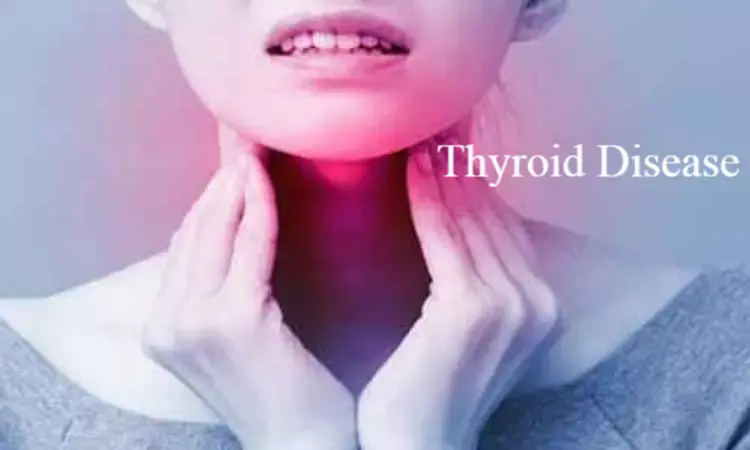- Home
- Medical news & Guidelines
- Anesthesiology
- Cardiology and CTVS
- Critical Care
- Dentistry
- Dermatology
- Diabetes and Endocrinology
- ENT
- Gastroenterology
- Medicine
- Nephrology
- Neurology
- Obstretics-Gynaecology
- Oncology
- Ophthalmology
- Orthopaedics
- Pediatrics-Neonatology
- Psychiatry
- Pulmonology
- Radiology
- Surgery
- Urology
- Laboratory Medicine
- Diet
- Nursing
- Paramedical
- Physiotherapy
- Health news
- Fact Check
- Bone Health Fact Check
- Brain Health Fact Check
- Cancer Related Fact Check
- Child Care Fact Check
- Dental and oral health fact check
- Diabetes and metabolic health fact check
- Diet and Nutrition Fact Check
- Eye and ENT Care Fact Check
- Fitness fact check
- Gut health fact check
- Heart health fact check
- Kidney health fact check
- Medical education fact check
- Men's health fact check
- Respiratory fact check
- Skin and hair care fact check
- Vaccine and Immunization fact check
- Women's health fact check
- AYUSH
- State News
- Andaman and Nicobar Islands
- Andhra Pradesh
- Arunachal Pradesh
- Assam
- Bihar
- Chandigarh
- Chattisgarh
- Dadra and Nagar Haveli
- Daman and Diu
- Delhi
- Goa
- Gujarat
- Haryana
- Himachal Pradesh
- Jammu & Kashmir
- Jharkhand
- Karnataka
- Kerala
- Ladakh
- Lakshadweep
- Madhya Pradesh
- Maharashtra
- Manipur
- Meghalaya
- Mizoram
- Nagaland
- Odisha
- Puducherry
- Punjab
- Rajasthan
- Sikkim
- Tamil Nadu
- Telangana
- Tripura
- Uttar Pradesh
- Uttrakhand
- West Bengal
- Medical Education
- Industry
Management of thyroid disease: NICE guidelines

A summary of a recent guideline from the National Institute for Health and Care Excellence (NICE), published online in The BMJ, recommendations are presented for the assessment and management of thyroid disease.
Thyroid disease, comprising thyroid dysfunction and enlargement, is common and often identified in primary care. Conditions causing thyroid dysfunction can be broadly divided into those that result in thyroid gland under-activity (overt and subclinical hypothyroidism) or overactivity (thyrotoxicosis). Hypothyroidism is usually managed by general practitioners.
In the summary, Melina Vasileiou, from the Royal College of Physicians in London, and colleagues present some of the most recent NICE recommendations on thyroid disease assessment and management, which are based on systematic reviews of the best available clinical evidence.
Key recommendations-
- A starting levothyroxine dose of 1.6 μg/kg/day (rounded to the nearest 25 μg) is recommended for adults under 65 years old with primary hypothyroidism and no history of cardiovascular disease
- A starting levothyroxine dose of 25-50 μg/day with titration is recommended for adults aged 65 and over and adults with a history of cardiovascular disease
- Natural thyroid extract is not recommended and liothyronine (alone or in combination with levothyroxine) is not routinely recommended for treating people with primary hypothyroidism
- Aim to maintain thyroid-stimulating hormone (TSH) levels within the reference range when treating primary hypothyroidism with levothyroxine; if symptoms persist consider adjusting the dose of levothyroxine further to achieve optimal wellbeing, but avoid using doses that cause TSH suppression or thyrotoxicosis
- Radioactive iodine is recommended as first-line treatment for thyrotoxicosis with hyperthyroidism unless antithyroid drugs are likely to achieve remission or it is unsuitable
"There has been uncertainty in the U.K. about the best treatment for hyperthyroidism despite radioactive iodine being the most common first-line treatment for this condition in the U.S.," a coauthor said in a statement. "We are very pleased to have been able to work with NICE to provide clear new guidance which we hope will improve outcomes for patients with this condition."
For more details click on the link: DOI: https://doi.org/10.1136/bmj.m41
Hina Zahid Joined Medical Dialogue in 2017 with a passion to work as a Reporter. She coordinates with various national and international journals and association and covers all the stories related to Medical guidelines, Medical Journals, rare medical surgeries as well as all the updates in the medical field. Email: editorial@medicaldialogues.in. Contact no. 011-43720751
Dr Kamal Kant Kohli-MBBS, DTCD- a chest specialist with more than 30 years of practice and a flair for writing clinical articles, Dr Kamal Kant Kohli joined Medical Dialogues as a Chief Editor of Medical News. Besides writing articles, as an editor, he proofreads and verifies all the medical content published on Medical Dialogues including those coming from journals, studies,medical conferences,guidelines etc. Email: drkohli@medicaldialogues.in. Contact no. 011-43720751


